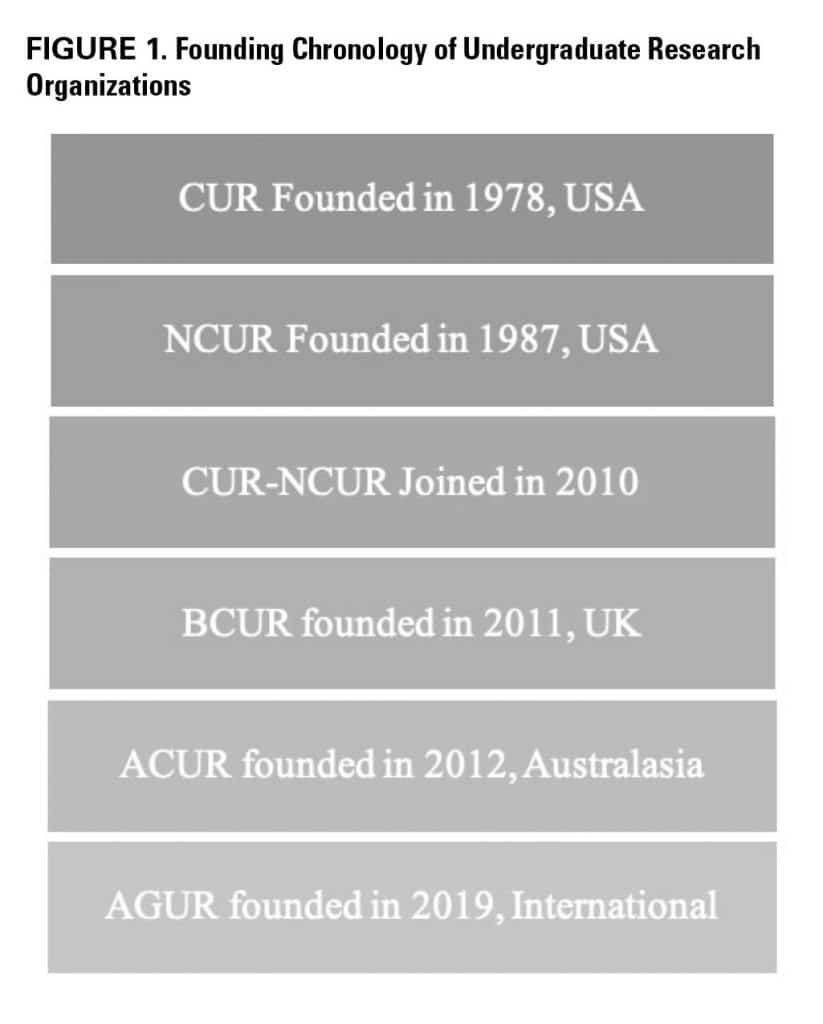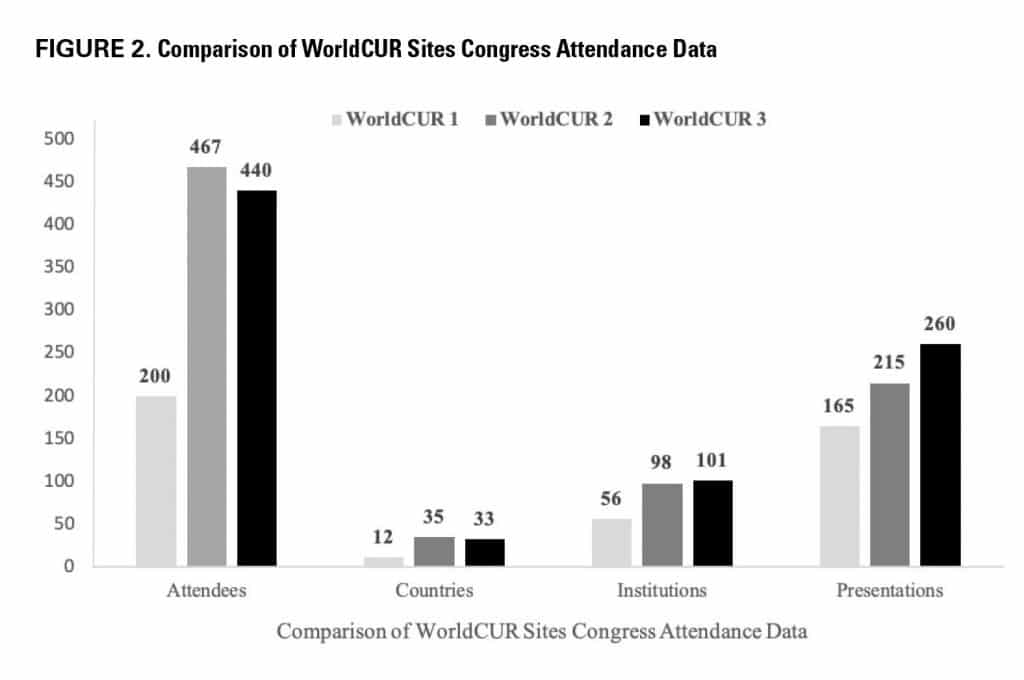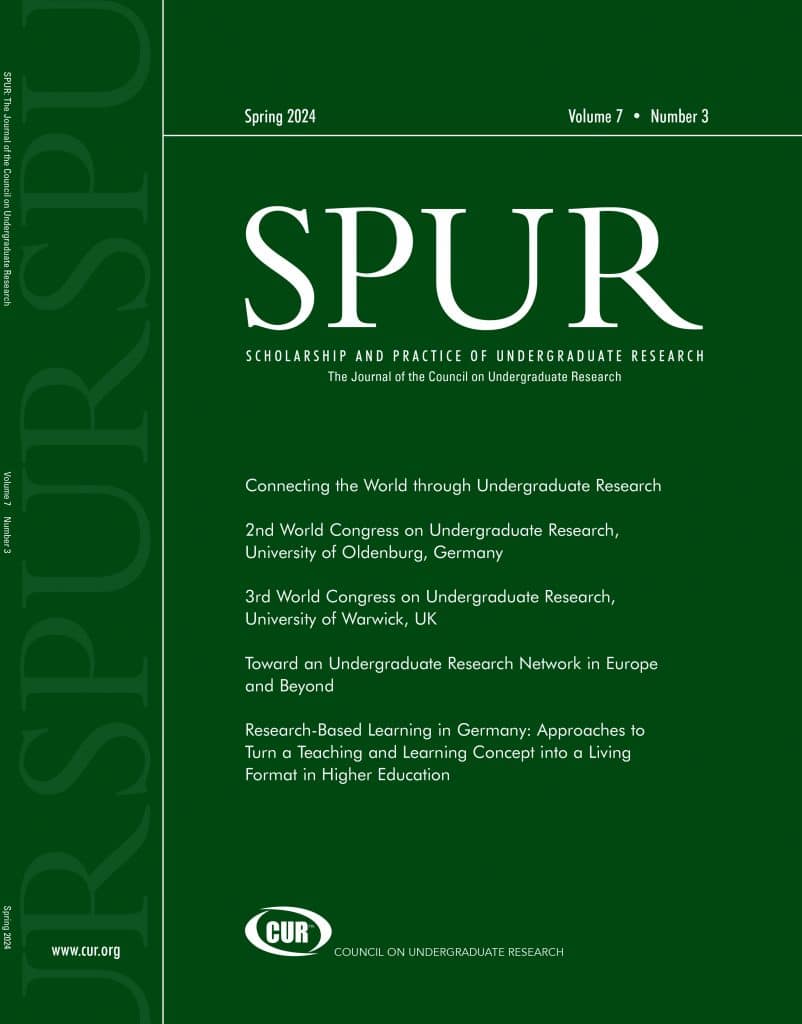SPUR (2024) 7 (3): https://doi.org/10.18833/spur/7/3/5
Spreading the value of undergraduate research globally is the main aim of the nascent Alliance for Global Undergraduate Research (AGUR) and its hallmark conference, the World Congress on Undergraduate Research (WorldCUR). This commentary highlights the historical development of AGUR, WorldCUR, their mission, main objectives, impact, and the “Doha Declaration,” a partnership framework for the “Internationalization” of undergraduate research. Recognizing the benefits of student research engagement, AGUR and WorldCUR strive to extend these formative experiences to the largest number of students around the globe. WorldCUR has so far positioned AGUR to connect the world through undergraduate research, bringing together student researchers from around the world to tackle the most significant challenges the world faces and to engage in scientific dialogues for knowledge production and sharing.
Recommended Citation: Khelifa, Maher. 2024. Connecting the World through Undergraduate Research. Scholarship and Practice of Undergraduate Research 7 (3): 12-16. https://doi.org/10.18833/spur/7/3/5
About WorldCUR
WorldCUR is an international congress held every three years since 2016 in different parts of the world. So far, three WorldCUR editions have been organized; the First WorldCUR was held at Qatar University, Qatar in 2016, the Second took place at the University of Oldenburg, Germany in 2019, and the Third was held at the University of Warwick, UK in 2023 (one year behind schedule because of the Covid-19 pandemic).
WorldCUR aims to promote student research globally by bringing together undergraduates to celebrate their research engagement and to share their research discoveries. It seeks to provide undergraduates with collaborative research opportunities on themes representing significant challenges facing the global community across many different fields of inquiry. In three WorldCUR iterations, students from around the world came to share their research findings on select congress topics. They discussed in thematic sessions global issues and proposed future collaborative research agendas to address such matters (University of Oldenburg 2019; University of Warwick 2023). An essential WorldCUR aim is to offer undergraduates occasions to develop friendships, professional networks and research partnerships, and to enjoy the social and cultural sides of the event. WorldCUR also offers mentors, professionals and association members a chance to connect and to engage in a global dialogue with an aim to share knowledge and best practices and to generate collaboratively ideas that promote student research globally.
Internationalization of Undergraduate Research and the World Congress
National Undergraduate Research Councils were instrumental in the promotion of student research scholarship. The Council on Undergraduate Research (CUR), founded in 1978, played a pioneering role in promoting and advancing an academic interest in student research. The National Conference on Undergraduate Research (NCUR), established in 1987, continues to showcase student research prowess annually. CUR and NCUR were initially two separate organizations, but the two officially joined and NCUR became part of CUR in 2010, so it is not, as a conference, equivalent to the other councils. Since CUR was the first Council, it has been inspirational in the establishment of both the British Conference of Undergraduate Research (BCUR) in 2011 and the Australasian Conference of Undergraduate Research (ACUR) in 2012.

These organizations have markedly influenced student research development within their respective borders as demonstrated through annual national student research conferences and sizeable membership enrollment (for more information about CUR, BCUR and ACUR, please refer to the following sites: https://www.cur.org/, https://bcur.org.uk/, https://www.acur.org.au/). They also have led the advancement of undergraduate research internationally. When these councils recognized the need to disseminate the value of student research scholarship globally and to promote its benefits worldwide, they joined forces to stage three World Congresses and establish the Alliance for Global Undergraduate Research (AGUR) in 2019. Figure 1 provides a historical overview of the creation of the different organizations.
The vision for staging an international student research conference began to take shape in 2001 during “The Undergraduate Students Research Symposia” at Zayed University, United Arab Emirates. However, the first discussions of an international event took place in 2010 with CUR executive leadership during the CUR Undergraduate Research Institute in Tampa, Florida in 2010. The idea was to bring together students and research mentors from all over the world to highlight the value of student research. Attending further CUR Institutes and NCUR conferences offered additional opportunities to discuss and develop the idea further. While the story of how the First World Congress came about has been well documented, (note -Rivera et al., 2018), it is important to acknowledge here that the most significant discussions were held during the April 2014 NCUR conference in Lexington, Kentucky, with Dr. Elizabeth Ambos, CUR Executive Officer; Dr. Maher Khelifa, Professor of Psychology, Qatar University; Dr. Julio Rivera, CUR President; and Dr. Stuart Hampton-Reeves, BCUR President. Following these preliminary talks, follow up emails and videoconference calls were regularly held with this core leadership group to shape the vision for the First WorldCUR. Dr. Angela Brew, ACUR Chair, joined the group in the early phases of the discussions. The WorldCUR Steering Committee was thus formed, and monthly conference calls were held until the First World Congress took place in November 2016. During the first meetings, the nature and scope of the event were considered, namely congress vs. conference. Given the global nature of the projected scientific gathering, the broader range of themes and topics to be covered, and the diverse nature of the targeted audience, the Steering Committee opted for congress rather than conference appellation. Following the event, the WorldCUR Steering Committee continued to meet to evaluate the impact of the Congress and to prepare the Second WorldCUR in Germany. Dr. Denise Wood, ACUR Vice-Chair represented ACUR at the First WorldCUR and in subsequent WorldCUR Steering Committee meetings.
The Doha Declaration: A Collaborative Vision for the Promotion of Undergraduate Research
In November 2016, Qatar University, CUR, BCUR, and ACUR organized the inaugural WorldCUR and signed the “Doha Declaration”. This Declaration was a partnership framework that led to the creation of AGUR in May 2019, an alliance for the advancement of global undergraduate research.
The “Internationalization” of student research scholarship was the driving impetus for the Doha Declaration. It broadly anticipated AGUR’s mission to “nurture and help coordinate the internationalization of undergraduate research, to facilitate the creation of new undergraduate research bodies, and to host periodic World Congresses around the world.” As it continues to develop, AGUR endeavors to stage more WorldCUR events in different parts of the world and to pursue its projected most significant role that of promoting student research globally.
Three WorldCUR Editions: A Global Undergraduate Research Presence
The First WorldCUR was held at Qatar University from November 13-16, 2016. More than 200 students, scholars, and administrators representing 12 countries, 4 continents and 56 institutions attended the event. Also in attendance were high-level representatives of CUR, BCUR, and ACUR, and a representative of the National Science Foundation, a US agency that funds fundamental research and education. The Congress offered an opportunity for undergraduate students from Australia, the Americas, Europe, the Gulf region, and the Middle East to share their research discoveries (Rivera et al. 2018). The Congress was also a forum for Councils’ delegates, faculty, and administrators from around the world to share their experiences, best practices and to work together to generate ideas for the promotion of student research globally. These encounters created a real momentum for the Congress and culminated in the historic signing of the “Doha Declaration. The First WorldCUR was also historic for planting the seed for the development of a global undergraduate research movement and the later creation of AGUR. During this Congress, the Steering Committee also approved the hosting of the Second WorldCUR by the University of Oldenburg, Germany in 2019.
In the Second WorldCUR, the momentum created by the inaugural event was noticeable with the documented significant increase in attendance of delegates and the number of oral and poster presentations (467 delegates, 252 students representing 35 countries and 98 universities). The event included 133 oral presentations and 82 poster presentations (University of Oldenburg 2019). During the Congress, the WorldCUR Steering Committee met to elect a board for the newly created “Alliance for Global Undergraduate Research.”
Building on the success of the two previous Congresses, the Third WorldCUR was jointly organized by WorldCUR and BCUR leadership and took place at the University of Warwick, UK from April 3-6, 2023. The event saw a growth in the number of participating universities and student presentations, as shown in Figure 2. It counted 440 delegates representing 101 institutions and 33 countries and included 260 presentations including spoken, exhibition, performance and poster presentations (University of Warwick 2023). The Third WorldCUR also pursued an innovative “International Student Research Projects” initiative by bringing together students based in various continents prior to the Congress to work collaboratively on a project from one of the Congress themes under the supervision of a faculty mentor. These students shared their research findings and experiences at the event.

WorldCUR, as AGUR’s flagship conference, succeeded this far to create a strong and sustained momentum for the internationalization of undergraduate research. A new request for proposals to host the Fourth WorldCUR is in progress, and AGUR looks forward to staging another global celebration of student research findings.
The Alliance for Global Undergraduate Research
The First WorldCUR was an initial effort to internationalize student research scholarship. For the first time, CUR, BCUR, and ACUR worked together with Qatar University to initiate beyond-ones-own-border reflections about student research development and promotion. These regional councils together played a historic role in creating AGUR as an international body to drive the effort of disseminating undergraduate research beyond their own geographic boundaries. The main aims of the Alliance were to promote student research globally and to connect the world through undergraduate research. During the Second WorldCUR, AGUR adopted the following important short and long-term objectives:
- to promote undergraduate research globally,
- to foster student research collaborations and partnerships around the globe,
- to disseminate international best practices in undergraduate research and to encourage student research scholarship,
- to offer summer research institutes around the globe for student research engagement,
- to help fund student research projects on a competitive basis,
- to help fund student conference attendance on a merit basis, especially students from low-and middle-income countries,
- to publish a student research journal,
- to create professional development opportunities for faculty, and
- to create an international network of mentors for student researchers.
Spreading the value of undergraduate research internationally is thus a core goal and a main AGUR mission. Recognizing the benefits of students’ research involvement, AGUR will endeavor to extend these formative experiences to the highest number of students around the globe.
WorldCUR Impact
Throughout its first three editions, WorldCUR sought to support the internationalization of undergraduate research and created real momenta for a sustainable global undergraduate research movement. WorldCUR reached the following goals:
- created occasions for undergraduate researchers to share, learn and excel through research discoveries,
- prompted the next generation of scholars to begin to address some of the most pressing challenges the world faces and to open scientific diaglogues for knowledge sharing and exchange,
- empowered undergraduate students to create international research collaborations and international connections and networks,
- encouraged future scientists and scholars to travel abroad out of their comfort zones, to share and learn not only about research findings but also about other people and cultures,
- enlarged students’ cultural experiences and awareness and removed few myths and prejudices along the way,
- brought mentors and key administrators together from all over the world to share research expertise and best practices.
As the literature on undergraduate student conference participation shows (Hill and Walkington 2016; Kneale et al. 2016; Mabrouk 2009; Spronken-Smith et al. 2013; Walkington, Hill, and Kneale 2017), similarly WorldCUR student participants reported many positive take-aways from their research engagement (see Khelifa 2019; Rivera et al. 2018; University of Oldenburg 2019; University of Warwick 2023). Student informal reflections (Montana State University 2016; Qatar University 2023; University of Toledo News 2016) as well as their post-WorldCUR survey responses conveyed very encouraging feedback. In general, students reported gaining in self-confidence, a heighten ability to take risks, and to connect with people from other countries. A Third WorldCUR participant captured the transformative research experience best: “Beyond the presentation I did, I connected to more new people across different disciplines and places. Connections that am very sure are for a life time and of mutual benefit. I was challenged in many ways. Listening to amazing work undergraduates are doing across the world, I was energized to do much more.” (University of Warwick 2023).
Future Perspectives
The success of the three WorldCUR iterations have so far positioned AGUR to create global undergraduate research connections for students, faculty mentors, and administrators. However, AGUR still has challenges to address in moving from a steering committee to a larger association in fulfilling its promise as a global alliance to advance undergraduate research. This will require determining its structure and member requirements, addressing organizational legal and procedural issues, and establishing an official website presence. Presently, AGUR is preparing a new call for proposals for the hosting of the next WorldCUR that will feature a new worldwide celebration of undergraduate research.
Data Availability Statement
The data, critical questions used in scripts, and instruments underlying this study are available within the text. These data were also derived from sources in the public domain [University of Oldenburg. 2019. “Looking Back Congress Impressions and Facts”, https://uol.de/fileadmin/user_upload/lehre/flif/WCUR2019/World_CUR_2019-Retrospect_web.pdf?v=1571934354; University of Warwick. 2023. “The International Conference of Undergraduate Research, https://warwick.ac.uk/fac/cross_fac/iatl/studentresearch/bcur_worldcur_2023/].
Institutional or Ethics Review Board Statement
Not required, the research did not involve human or animal participants.
Conflict of Interest Statement
The author declares having no conflicts of interest.
References
Hill, Jennifer, and Helen Walkington. 2016. “Developing Graduate Attributes through Participation in Undergraduate Research Conferences.” Journal of Geography in Higher Education 40: 222–237. doi: 10.1080/03098265.2016.1140128
Khelifa, Maher. 2019. “Qatar University Students Attend the Second World Congress on Undergraduate Research.” Qatar University Research Magazine 12: 28-30.
Kneale, Pauline, Andrew Jones, Helen Walkington, and Jennifer Hill. 2016. “Evaluating Undergraduate Research Conferences as Vehicles for Novice Researcher Development.” International Journal for Researcher Development 7: 159–177. doi: 10.1108/ijrd-10-2015-0026
Mabrouk, Patricia Ann. 2009. “Survey Study Investigating the Significance of Conference Participation to Undergraduate Research Students.” Journal of Chemical Education 86: 1335–1340. doi: 10.1021/ed086p1335
Montana State University. 2016. “Recent MSU graduate to present at World Congress on Undergraduate Research in Qatar.” Accessed December 3, 2016. https://www.montana.edu/news/16320/recent-msu-graduate-to-present-at-world-congress-on-undergraduate-researchin-qatar
Qatar University. 2023. “QU’s College of Medicine Students Participate in the World Congress on Undergraduate Research 2023” Accessed 1/11/2023. https://www.qu.edu.qa/sites/en_US/about/newsroom/CMED/QU%E2%80%99s-College-of-Medicine-Students-Participate-in-the-World-Congress-on-Undergraduate-Research-2023
Spronken-Smith, Rachel, Jason Brodeur, Tara Kajaks, Martin Luck, Paula Myatt, An Verburgh, Helen Walkington, and Brad Wuetherick. 2013. “Completing the Research Cycle: A Framework for Promoting Dissemination of Undergraduate Research and Inquiry.” Teaching and Learning Inquiry 1: 105–118. doi:10.2979/teachlearninqu.1.2.105
Rivera, Julio, Maher Khelifa, Bushra Abu Hamdah, Aisha Mohammed Al-Hamadi, and Emma S. Zdgiebloski. 2018. “A Global Conversation: Reflections from the First World Congress on Undergraduate Research.” SPUR 2(1): 55–59.
University of Oldenburg. 2019. “Looking Back Congress Impressions and Facts”. Accessed September 3, 2023. https://uol.de/fileadmin/user_upload/lehre/flif/WCUR2019/World_CUR_2019-Retrospect_web.pdf?v=1571934354
University of Warwick. 2023. “The International Conference of Undergraduate Research”. Accessed September 3, 2023. https://warwick.ac.uk/fac/cross_fac/iatl/student-research/bcur_worldcur_2023/
University of Toledo News (UTNews). 2016. “Undergraduate Student Presents Cancer Research at Global Conference.” Accessed November 21, 2016. http://utnews.utoledo.edu/index.php/11-14-2016/undergraduate-student-presents-cancerresearch-at-global-conference Billau, Christine. 2016.
Maher Khelifa
Qatar University, Maher.khelifa@qu.edu.qa
Maher Khelifa is an associate professor at Qatar University. He holds an MS and a Ph.D. from the University of Kansas. He served as assistant dean of the College of Family Sciences, Chair of the Department of Social and Behavioral Sciences, Chair of the Undergraduate Research Scholars Program, Head of the Department of Social Sciences, and Chair of Qatar University Undergraduate Student Research Committee. Maher is currently the Chair of the Alliance for Global Undergraduate Research.
More Articles in this Issue
No posts found


